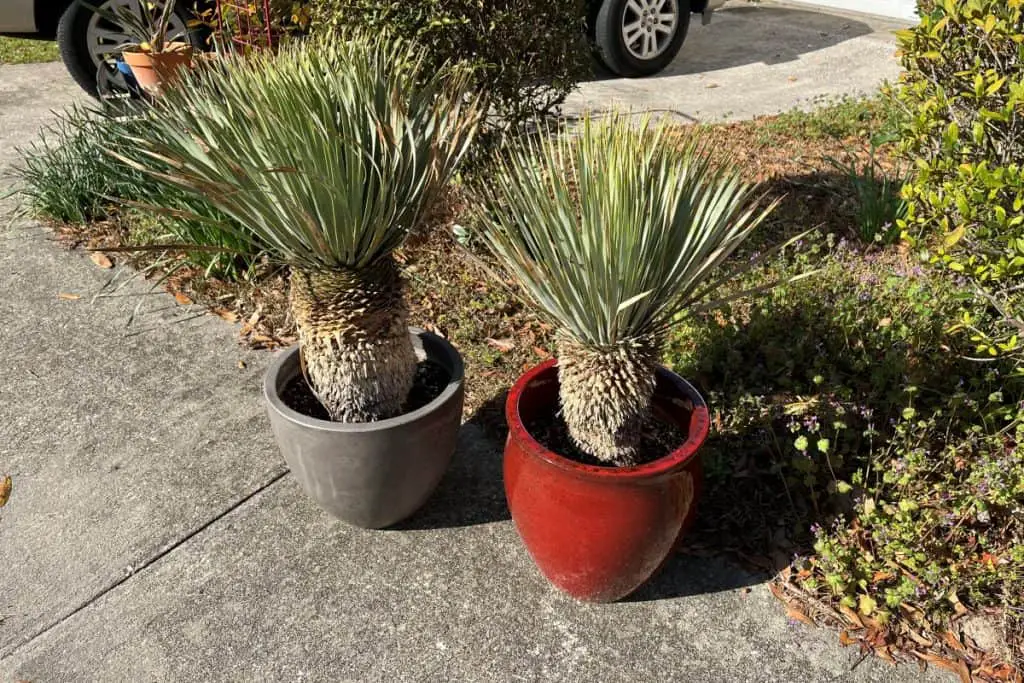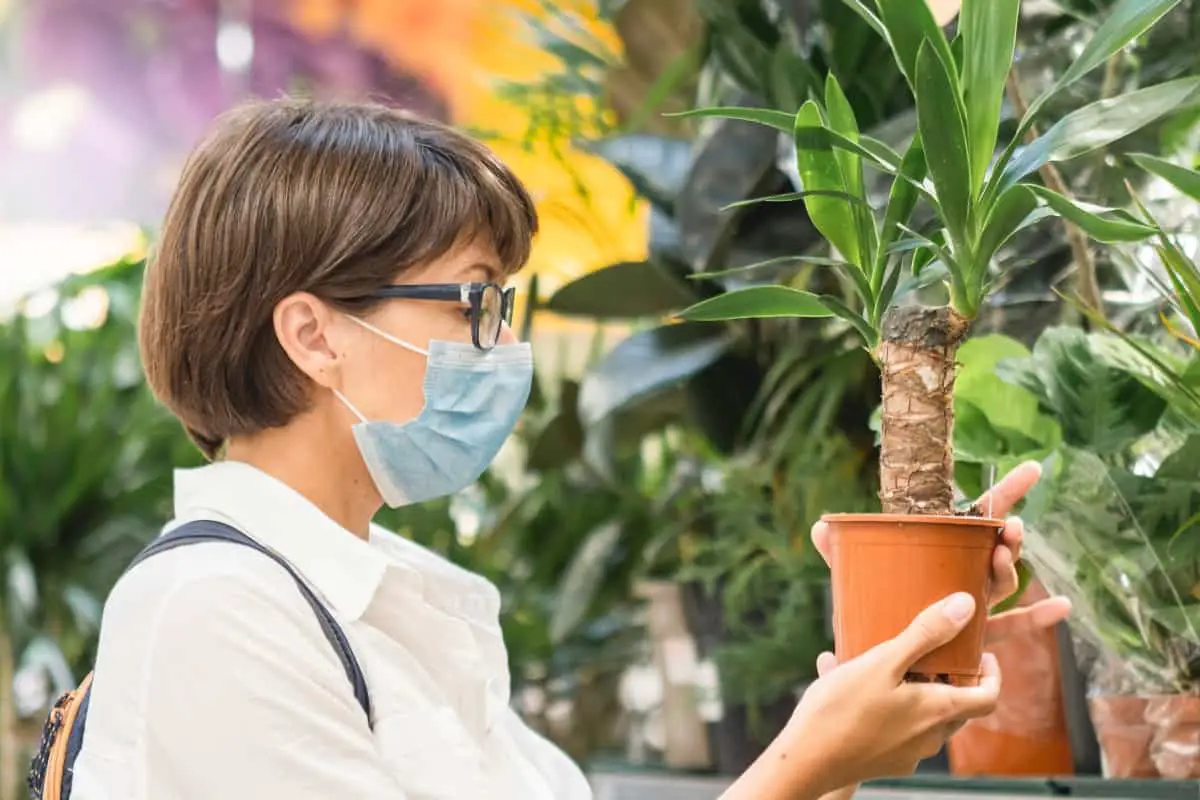If you are interested in growing yucca, you want to know if they are expensive and how much they cost. Yuccas are wonderful plants for the novice and professional growers alike. Finding the yucca that is in your price range can be well worth the challenge.
On average, common yucca plant seedlings and starts available in one-to-two-gallon pots sell for $30 or more. Larger yucca plants and those that are rare easily become expensive, selling for hundreds of dollars for a single plant.
What type of yucca should you buy? Should you start with a baby yucca or go for a more expensive larger yucca? We are here to help you find the right yucca for your garden that is, hopefully, within your price range.
Why Are Yuccas So Expensive?
Yucca are expensive because most take a long time to grow. It takes at least 35 days for a yucca seed to germinate. If the yucca is propagated from a cutting, it can take up to four weeks for the cutting to produce roots.
The young tender plant is vulnerable to insects, animals and weather conditions while growing. The common yucca can take up to three years to mature. It can take five years or more for the yucca to flower.
Hey, you’ll like this one too: Can You Cut the Top Off a Yucca
What Does the Spineless Yucca Cost?
On average, the Spineless Yucca costs around $45 for a 10-inch pot. Though the average 10 inches can easily cost more than $50, the price for these plants quickly rises, and a sizeable spineless yucca can cost more than $250 for a three-gallon plant.
This yucca is also known as:
- Yucca Elephantipes
- Yucca Guatemalensis
- Spineless Yucca
- Stick Yucca
The spineless yucca is often propagated from a well-established, living plant stem.
The Yucca Guatemalensis is also known as Yucca Gigantea. It is in a different family from the Yucca Elephantipes, which is in the Asparagaceae family. Both are considered spineless yucca.
People enjoy the yucca cane as house plants because, as their name suggests, they do not have the sharp spines on the foliage. They do still have a sharp tip on the ends of their leaves. The stick yucca is originally from the more tropical environment of Mexico.
These yucca plants can reach heights of thirty feet. Spineless yucca will require pruning when grown indoors because they grow so tall. They are also one of the fastest growing yucca varieties.

How Much is a Rostrata?
The Yucca Rostrata prices begin at $30 for a four-inch pot. These yuccas are considered rare. The larger the plant, the more expensive it will be. A 25-gallon Rostrata yucca can easily fetch $500 or more.
The Yucca Rostrata is also known as:
- Beaked
- Blue Beaked
- Silver
- Big Bend
These slow growers are large, beautiful plants with showy blue-green foliage. They can grow to eight feet in width and up to sixteen feet tall with the flower stalk. The flowers are white and bloom on the top of the stalk. The leaves are quite rigid and sharp, making them an excellent choice for a sunny outdoor location.
To give you an idea of how much a Yucca Rostrata costs, this one is available for just under $60 for a four-inch pot. In addition, it is possible to buy yucca rostrata seeds. They cost about nine dollars for fifteen seeds.
It will take at least two months for the seeds to germinate, and then the plants should be grown indoors for about two years before being planted outdoors.
What’s the Cost of an Adam’s Needle?
Adam’s Needle Yucca prices start at approximately $27 for a one-gallon pot. These are some of the least expensive yucca plants to purchase. Adam’s Needle yucca are also known by their scientific name, Yucca Filamentosa. They are a slow-growing plant and can take up to five years before it blooms.
There are some name variations of Adam’s Needle Yucca. Some of these include:
- The Color Guard Yucca is an Adam’s Needle yucca with beautiful variegated leaves of creamy white with a deeper green. A plant in a two gallon pot costs about thirty-one dollars.
- The Excalibur, which is also known by:
- Silk Grass or Carolina Silk Grass
- Needle Palm
- Thready Adam’s Needle
- Spoonleaf Yucca
These names are often used without the word “Excalibur.” Adam’s Needle seeds can be purchased for about eight to fifteen dollars.
These plants are showy and withstand drought-stricken soils well. The leaves are sharp with a long needle-like spike at the tip. Wispy threads also come from the stiff leaves. They grow to be up to four feet wide and up to eight feet tall.
The threads and needle-spike were used for sewing. The threads were also used for weaving cloth for clothing and basketry, and they still are today. The flowers of the Adam’s Needle are edible and often cooked. The roots have been used to make soap that can be used as shampoo and more.
What Does a Yucca Gloriosa Cost?
Yucca Gloriosa plants range in price from about thirty-three dollars for a five-gallon pot to ninety dollars for a fifteen-gallon pot. The size of the plant will determine the cost. These yucca plants are like the Adam’s Needle yucca, with broader leaves and growing into a tree-like structure.
Yucca Gloriosa is also called by various names, many of which are shared with the Adam’s Needle. However, it grows from noticeable above-ground stems systems making them appear more tree-like. Some of the common names for yucca gloriosa are:
- Spanish Dagger
- Mound Lily or moundlily
- Roman Candle
- Palm Lily
These yucca are also part of the Agavaceae family and some parts of the plant are edible. The fibers are used in textiles, while the roots can be made into soap. They grow somewhat slow and can reach a height of ten feet with a width of ten feet.
The leaves of the yucca gloriosa can be very long, up to 36 inches in length, and have an extremely sharp dagger-like point that can easily pierce skin and clothing. This makes them quite suitable for security borders, though many gardeners will snip off the sharp spikes to make the plant safer.
Yucca Gloriosa comes in a variegated style called the Bright Star yucca. It is a beautiful plant with blue-green and yellow striped leaves. The seeds are easily obtainable and can be purchased for about fifteen dollars for thirty seeds.
Hey, you’ll like this one too: What are the Bugs on My Yucca
How Much Does a Joshua Tree Yucca Cost?
Joshua trees are available to buy in a price range of $75 to $600, with the average price around $235 dollars for a five-foot tall yucca. These are very large yucca plants that are native to the southwest deserts.
Joshua Tree’s scientific name is Yucca Brevifolia. It also has a few other common names such as:
- Yucca Palm
- Palm Tree Yucca
- Tree Yucca
These yucca grow from a wide, tall trunk. They flower and branch off, making them resemble trees. They can grow up to seventy feet tall, but most do not get taller than forty feet. They are found in the Mojave desert in California.
These are a protected species. You must obtain a permit to collect wild Joshua tree specimens, and most states require the Joshua trees to be tagged if they are obtained in the wild and sold. So, if you buy a Joshua Tree, keep the tag in a safe place so you can prove you obtained it legally.
Seeds of the Joshua tree are easy to find and available for sale and range in price from about $6.50 to more than sixteen dollars. Since they are protected, you may want to find out more information from the seller before purchasing seeds.
The Expense of The Yucca
Yucca plants are expensive. They are often slow growers and propagate from seed and cuttings. Most yucca are quite bushy with sharp leaves that require careful packaging when being shipped to protect the plant and the handlers from harm.
Even though yuccas are expensive, they are very easy to care for, often thriving despite neglect, provided they are in well-drained soil and sun. Yucca can live for five years or more. Tree type yucca can live as long as sixty years. So, in the long run, the initial expense is not as outrageous as it may seem.
If you are patient and willing to wait a few months to years for your yucca to grow large, buying yucca seeds is much more economical.
If you purchase any of the plants or seeds recommended, please be aware we receive a commission at no cost to you. We hope if you do purchase, that you enjoy your yucca as much as we do!

